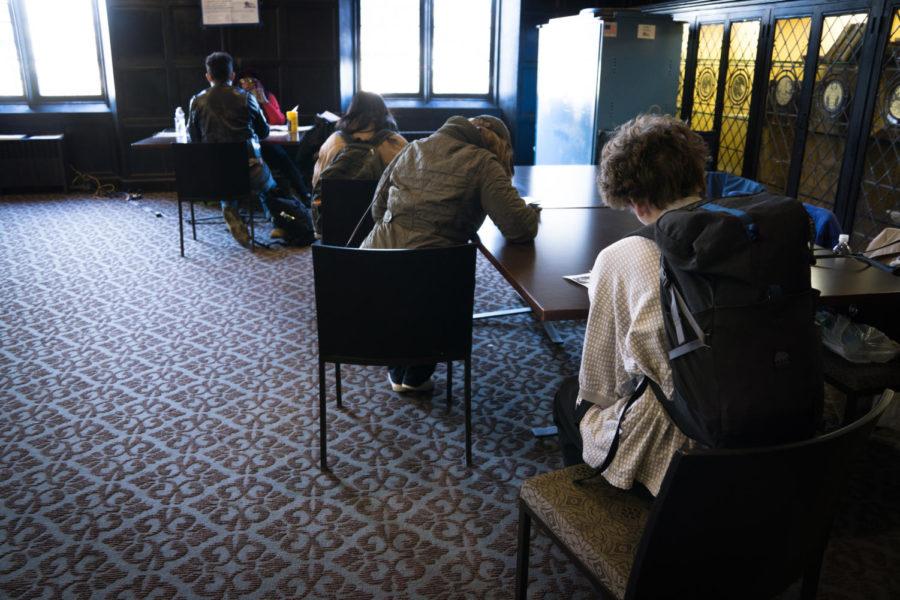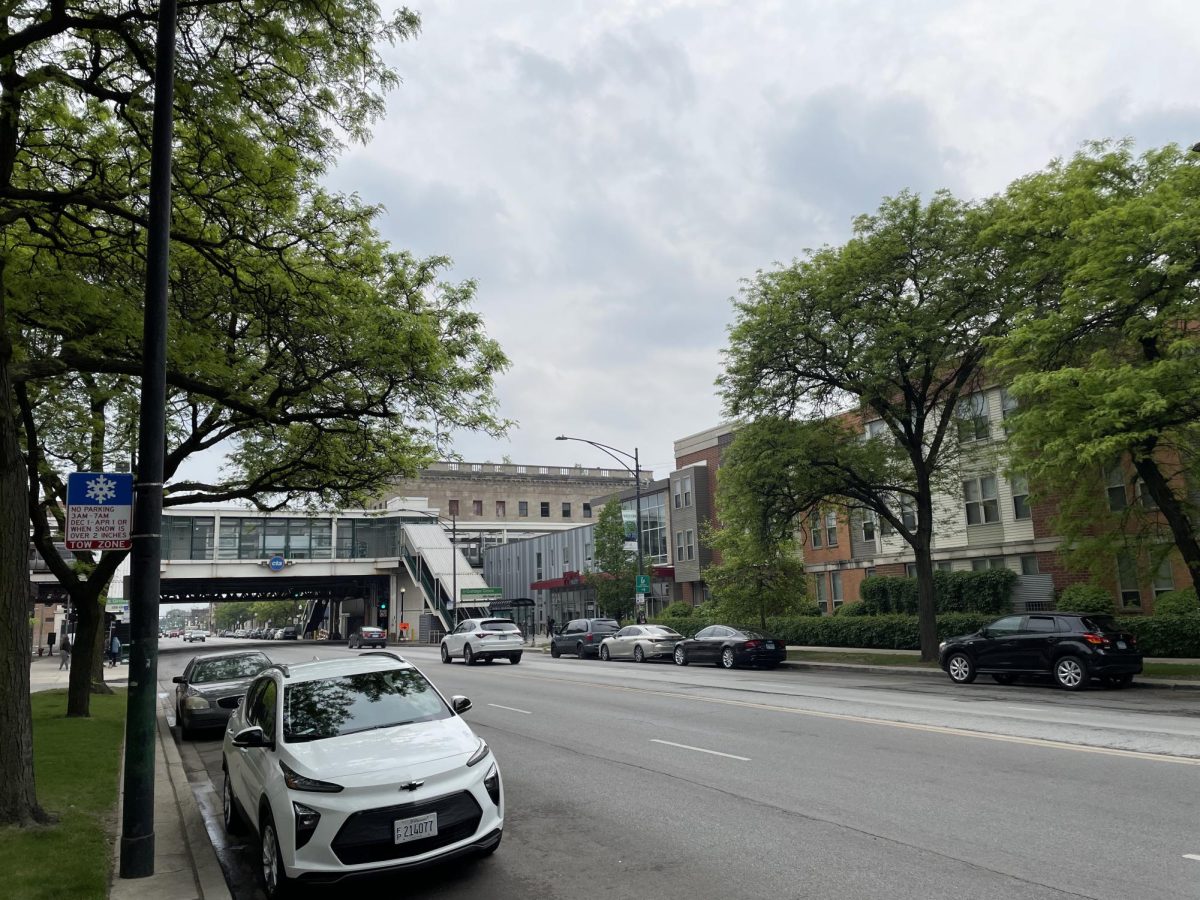Grey City sat down with UChicago political science professors to discuss the issues and the stakes of the upcoming United States presidential election. Here’s what they had to say:
Professor Tom Ginsburg on the U.S. Constitutional Democracy
The increasingly fraught and polarized political scene has sparked doubts among academics about the stability of our democracy. Political science and law professor Ginsburg ventures an answer to this concern in his new book, How to Save a Constitutional Democracy.
Ginsburg explained that America’s electoral system plays no small part in creating the fragility of the United States politics. The issues at play were foreseen by the founding fathers, he said, but they didn’t account for party loyalties to rise above a politician’s ambition in his own branch of government. In other words, he explained, American democracy is not immune to bad actors.
“If you have a leader who is really trying to destroy democracy actively and had the cooperation of the judges, that person would be able to succeed, I think. The constitution is not a foolproof system,” Ginsburg said.
The dangers of such a leader is that they undermine the efficacy of the institutions the Constitution has put forth and the people’s faith in the institutions themselves.
“Charismatic populists are people who claim to represent the people exclusively. So, the leader alone knows what the people want. Those people have an inherent distrust and thus try to undermine any intermediary institutions between the people and the leader, which includes the bureaucracy, media, and courts,” Ginsburg said. “A constitutional democracy cannot truly exist without these institutions functioning well. We need to follow the rule of law and not whatever the whims are of who happens to be the leader.”
Despite these concerns, Ginsburg is decidedly not worried that President Donald Trump will refuse to step down if former Vice President Joe Biden wins the election. The cause for his optimism? Optics. In his view, bad television would be the worst-case scenario for a former star of a reality show.
“There has been a lot of speculation about this: What if the Electoral College votes in December for Biden, but Trump refuses to step down? I’m not worried about that at all because, constitutionally, a new president will be sworn in on January 20. If need be, President Trump would have to be removed by the Secret Service, which would be very bad television. Since he is going to rely on television for his future career if he loses this election, I don’t see that happening,” Ginsburg said.
However, what Ginsburg does worry about is a possible impending constitutional legitimacy crisis.
“If there is a state where there is close election and the state legislature, which formally has the responsibility of sending the electors to the Electoral College,” Ginsburg explains, “if you had them overturn the will of the people in that state, which would be legal and constitutional under our system, it would create a major constitutional crisis.”
According to Ginsburg, the very foundation of the American constitution, or really that of any democracy, is that the representatives act in the interest of their constituents. A deliberate dismissal of the will of the people might shake people’s confidence in the legitimacy of a constitution that allows that.
Fortunately, in July, the Supreme Court ruled that faithless electors can no longer go rogue as part of the Electoral College.
One integral aspect of a functioning democracy is its fair and unbiased elections—a vital institution that is rapidly degrading in America and falling far behind its peers, Ginsburg said.
“There is no rich democracy that runs elections as badly as the United States,” Ginsburg said. “Indeed, there are many poor countries that run elections much better.”
This is in part because the U.S. has a highly decentralized system of election administration.
“In our country, we leave the rules of our voting to the states, and some of them not only don’t try to facilitate their citizens voting, but they try to hinder it,” Ginsburg said. “The people running these elections are partisan officials; they’re Secretaries of State, which in most states are elected officials of one party or the other.”
Ginsburg proposes the creation of a party-neutral federal bureaucracy to oversee U.S. elections.
Ultimately, in Ginsburg’s view, threats to our constitutional democracy did not start—nor will they end— with Donald Trump.
“Trump is a symptom of and an accelerant of the erosion of our democracy, which preceded his election and will probably continue regardless of what happens next month,” says Ginsburg. “We have to look not just at the personality but at the institutions and the processes that got us to this point.”
Professor Linda Zerilli on Women in Politics
After a Democratic primary season that put candidates’—particularly female candidates’—“electability” under the microscope, professor Linda Zerilli of the Department of Political Science, who studies the role of women and gender in politics, said that in choosing Kamala Harris as his vice presidential nominee, “Joe Biden made the politically smart choice.”
“He, as an individual, understands the importance of bringing people who have different experiences and perspectives into his administration,” Zerilli said. “The way in which he builds his cabinet will matter.”
But Zerilli is not only concerned with representation; she is also keeping an eye out for what roles women would play in his cabinet. She noted that, historically, women have often been appointed to cabinet positions associated with female gender norms, such as education.
“It will be interesting to see if he brings women into roles that we don't normally see women in, like security, foreign policy and so on. This is what Obama did with Hillary Clinton,” Zerilli said.
Some have argued that Biden’s commitment to choosing a woman as his running mate would merely be a performative gesture and a disservice to the nominee (and the public) due to the emphasis on gender over policy. This critique was also applied when Trump nominated Judge Amy Coney Barrett to the Supreme Court. Still, Zerilli does not believe that this critique applies to Harris.
“I think that Kamala Harris has a very clear sense of the extra burdens that women have in this society, particularly with the pandemic and the way in which the pandemic disproportionately affects women, especially women of color, but women generally,” Zerilli elaborated. “She will bring that experience to her role as VP.”
On the broader topic of women representatives in Washington, Zerilli said that women in Congress have taken up the role of “truth teller.”
“There are now more women serving in Congress, thanks to the last election where women came in in record numbers. I think to some people the very presence of women in Congress is already very agitating, but in some cases they do have to be willing to take the risk of saying things that may not make them ‘likable,’ like naming the elephant in the room,” Zerilli said.
Congresswomen have become truth tellers in the sense of bringing to light perspectives and systemic problems long ignored, but that does not necessarily mean there is more truth in politics than usual. Zerilli’s most recent publication revolved around truth-telling in politics: a practice of which the past four years have seen a concerning decline.
“It concerns me when democratic citizens stop expecting that their representatives tell them the truth. That should be an expectation. Not that [representatives] aren’t going to fail—they will—but we should still demand that of them,” Zerilli said.
She extended this criticism to the President’s withholding information about the severity of the pandemic earlier this year.
“To say that ‘I didn’t want to scare people’ is not a satisfactory way of dealing with democratic citizens,” she said. “We are adults and we need to know what is actually happening in our world so we can decide how we are going to collectively manage these problems.”
Professor Ruth Bloch Rubin on Partisanship
Assistant professor of political science Ruth Bloch Rubin, who studies American politics and political parties, discussed the stakes of the upcoming election and the partisan aspects of the electoral process.
Asked about concerns that President Trump would refuse to leave office if voted out, Bloch Rubin said that while she does not believe that the country is on the verge of dictatorship, there is still a lot at stake in this election.
“There are really salient policy reasons why this election matters, whether we get an economic recovery bill, how big, whether the stimulus bill works, whether people are pulled into even deeper poverty or lifted out, whether our schools will be able to open and run––those are the issues at stake,” she said. “The equalizing nature of the pandemic has made it easier for people to see each other as neighbors.”
Bloch Rubin is not concerned about Donald Trump staying in power after Inauguration Day. In her view, the ambitions of other politicians will safeguard the United States against a dictatorship.
“I’m fairly confident at minimum in the ambitions of other Republicans to prevent the current president from staying in power longer than he was intended to. If I am a Republican who wants to run for president someday, I can't if there is a dictator,” said Bloch Rubin.
While Bloch Rubin does not perceive an imminent threat of dictatorship, she does not believe that national elections provide completely fair representation. Bloch Rubin supports abolishing the Electoral College in favor of a popular vote.
“I think it is important for people elected to national office to reflect the popular will, and so if the majority of Americans want person A, then that person should be the president. It shouldn’t matter whether your state is more or less populous, that seems to increase the odds that people will find electoral outcomes illegitimate.”
Indeed, President Trump’s winning of the Electoral College and loss of the popular vote in the 2016 election provoked many to say that he was “not my president.” One reason pundits speculate that the Clinton campaign failed to win the Electoral College is that it spent most of its time trying to persuade voters in swing states instead of focusing on turning out votes in blue wall states, a group of states previously thought to be strongly Democratic, like Pennsylvania and Wisconsin.
In politically polarized times, the population of moderate voters appears to be dwindling as the gap between the driving political ideologies of the Republican and Democratic Parties continues to widen. As far as the disappearance of this so-called “undecided” block of voters, Bloch Rubin argues that “some would say there were never ‘undecided voters.’ When you ask people what their party affiliation is, you do have some people who will identify as independents, and we tend to think of these people as undecided. There are many people who for whatever reason want to identify as independent but vote like partisans.”
Moreover, Bloch Rubin explains, “We do have a small number of people who flip-flop. There’s the mythical Obama to Trump voter or Trump to Biden voter that these candidates have to persuade. In a very close election, every vote counts, so it is hard to deny that those individuals aren’t important, but turnout of the base is also important. If you can turn out the people who often don’t participate, but ideologically agree with you, then you wouldn’t need to care about these undecideds.”
Professor Eric Oliver on Political Polarization
With November 3 rapidly approaching, the division and distrust between Americans of different political parties is only growing.
For Eric Oliver, a professor of political science who studies contemporary American politics and political psychology, the polarization gripping the United States and the reason why you can’t find commonality with “your crazy uncle who you have to see on Thanksgiving” is more than just ideological disagreement.
“One reason why it's hard for the left and the right to talk to each other and understand what the other side is saying is largely because it's not simply just a difference in ideology, it's a difference in worldview,” he said.
This difference in worldview that Oliver describes is between what he calls “intuitionists” and “rationalists.”
“Intuitionists are people who utilize their gut feelings or intuition, and they're heavily swayed by symbols and metaphors. They're the kinds of people who have a lot of supernatural beliefs and paranormal beliefs,” he said. “A rationalist has kind of an Enlightenment worldview. They rely on production, logic, facts, science.”
Having either an intuitionist or rationalist way of thinking is not necessarily exclusive to political belief. However, Oliver said that over the past 30 years, the rise of the evangelical right as a core constituency group within conservative circles has led the Republican Party to embrace the intuitionist worldview.
“As a consequence of that, you'll see a lot more rhetoric on the right that expresses this kind of intuitionist worldview. And one of those types of rhetoric is conspiracy theories,” Oliver said.
From claiming that undocumented immigrants commit massive voter fraud to sending out a text message that antifa supporters attack American homes, throughout the past four years, Donald Trump has openly trafficked in and given rise to theories that have been continuously disproven. Among his most outspoken supporters include believers in QAnon, a far-right multi-level government conspiracy theory. “When [intuitionism] gets concentrated in the hands of a single party, like what we're seeing now sort of in the concentration of Trump's presidency, I think what you're going to see is a recipe for disaster,” Oliver said.
This matters not just because of what voters believe, but also because of what they do not. The shared sense of reality that should anchor political discourse perishes. For intuitionists, what are considered facts by rationalists may become meaningless. They may not be swayed by statistics on coronavirus deaths, for example, because they won’t believe it: mainstream news developments contradict their reality.
Democracy, on the other hand, relies on an informed public responding to real-life facts in a rational way.
“Democracy is conditioned to things like compromise and a shared assessment of what a fact is. Intuitionism is based on the symbol and metaphor and emotion,” Oliver said. “Those types of tendencies usually express themselves in very undemocratic ways….Their intuition is not very tolerant of dissent.”
How this deeply polarizing struggle and debate over reality will shake up the state of American democracy is yet to be known, but Oliver remains optimistic.
“I think Joe Biden is pretty likely to win the election and a big part of his appeal is from people who are rejecting this kind of intuitionist politics,” he said.
“I also sort of see, just on a day-to-day level, American democratic norms are still pretty strongly instilled in the vast majority of the country. Most people are pretty committed to democratic discourse, despite the polarization in our politics, you see a lot of small individual acts of decency. And those are the things that actually give me the greatest confidence,” Oliver said
Professor Zhaotian Luo on Electoral Manipulation
According to the Mueller Report released earlier this year, the 2016 election was influenced in some part by state-sponsored Russian online disinformation campaigns. Many onlookers have been concerned with the security of U.S. elections and apparent ease with which they can be manipulated, given the unprecedented rise of mail-in ballots and dissemination of misinformation criticizing electoral procedures and legitimacy.
Assistant professor Zhaotian Luo, who studies the role of information in politics, said that majority rule elections are easy to manipulate because there is a clear result: either a candidate wins or loses. There are two main ways in which candidates manipulate elections. First, they could simply falsify the election results if they know they could not win honestly. But the second way is more subtle: leading up to the election, the candidate could build confidence that they will win, such that their claim to victory goes unchallenged, no matter how narrow the margin.
Luo thinks that in the upcoming general election, the second way is a more likely outcome. In the case that “there is not a landslide victory, Trump might announce his own victory and that may be enough to persuade others from challenging him,” Luo explained. Or even if he loses by a slim margin, “he can accuse the other side of manipulation and that would make any election result suspicious.”
Postmaster General Louis DeJoy, appointed by the Trump-appointed USPS Board of Governors, had announced that “redundant or seldom used” mailboxes would be removed, but backlash from constituents forced a reversal of this policy. President Trump’s attempts to weaken the USPS serve to discourage eligible people from voting and undermine their confidence in the security of voting by mail. Luo said that if Trump is successful in changing the information conveyed by the election results by deterring voting, then “he might not be as popular as the voting result shows.”
Manipulating an election is a balancing act of scale, according to Luo. “If one manipulates too much, then people would lose faith and make the conclusion that they don’t believe the election result and go to the streets to protest. One must manipulate just right so that although people have suspicion that he has manipulated election results, not to the extent that would make people willing to go on the street,” Luo explained.
Most attempts to manipulate the outcomes of an election are obscured enough to be easily overlooked or explained, which is why it can be difficult to form a defense. Luo views the debate over voter ID laws from the 2016 election as an example of subtle election manipulation.
“In the previous election, there was a debate about requiring ID in the poll station, specifically to make some Democrats more difficult to cast a vote for. The problem is that such an action as requiring an ID is totally constitutional and Republicans have a rationale for it. This kind of manipulation, which we could not even confidently categorize as manipulation, is the most difficult to prevent.”
Given Russian interference in the 2016 election and potentially in the upcoming 2020 election, Luo commented on the comparative magnitude of the threats, saying that “domestic manipulation is on a much bigger scale than foreign manipulation.”
Professor Anthony Fowler on Early Voting
Mail-in-ballot counts so far show an unprecedented level of civic participation before Election Day. Voting before Election Day this year was largely expanded because of the ongoing COVID-19 pandemic and tens of millions of Americans have already voted.
However, the expansion of vote-by-mail has become a frequent point of contention this election cycle. Anthony Fowler, an associate professor in the Harris School of Public Policy, said that although voting by mail brings up new challenges for the election process, there is no reason to doubt its security.
“There are some reasons for me to be worried about mail voting, since there are additional security risks relative to in-person voting. For example, mail voting could make it easier for someone to cast someone else's ballot, tamper with ballots, or coerce someone to vote in a particular way,” he said. “However, there are lots of people working this election cycle to mitigate the risks, and there is currently no evidence of widespread fraud."
Throughout the election cycle, Republicans and the Trump administration have repeatedly attacked the integrity of mail-in voting and reforms that make voting more accessible. Fowler chalked this up to a broader, more diverse voting demographic that may emerge through these changes.
“The evidence does suggest that if everyone voted, this would likely benefit the Democratic Party in the short term because young people, poorer people, and non-white people are much less likely to vote under our current system,” and these groups are more likely to vote blue. Despite this fact, he adds that “studies find that mail voting does not systematically benefit either major party.”
Still, many Democrats hope that the current trajectory of early turnout is indicative of additional voters for former Vice President Joe Biden. While almost half of all likely voters plan to vote early, a Washington Post-ABC poll conducted from October 6 through October 9 shows a sharp partisan breakdown over when people say they will cast their ballot. 64% of likely Biden voters said they planned on voting early. In comparison, 61% of likely Trump voters said they plan to vote on Election Day.
Fowler warns against trying to make early predictions on the election outcome based on current early-voting turnout.
“It's hard to know whether the increase in vote-by-mail and early voting is a sign that many people are eager to vote against an unpopular incumbent, or if the people who would have voted anyway are voting early because of the pandemic,” he said.
Right now, Fowler says that dispersing accurate information about voting to the public is one of the most important things government officials, as well as the media, should be doing to make voting as easy and as secure as possible.
“Trust in election results is perhaps the most important thing in a democracy,” Fowler said.








